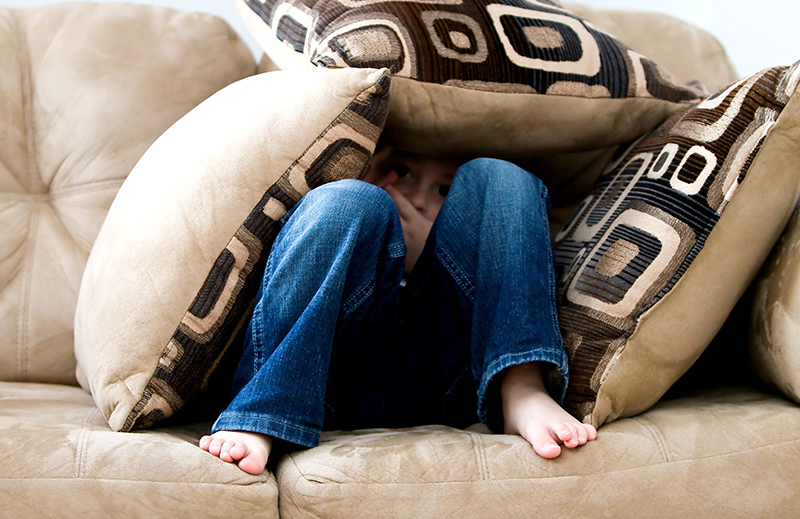For students, remote learning will have been one of the largest impacts to their day-to-day routine.
Now that kids and teens are slowly making their way back to school, many will struggle with the change - and some will be particularly anxious or reluctant about the return.
Parenting an anxious child can feel overwhelming and difficult, but there are ways you can help your child cope and reduce the stress.

It is important to recognise that to feel anxious is a normal experience among human beings. Anxiety can sometimes arise in response to a stressful temporary circumstance, for example, returning back to school after being away for a few months, such as in these COVID-19 circumstances.
The anxiety may present as school reluctance such as crying, tantrums or refusing to attend school altogether. Anxiety triggers threatening feelings into our brain to respond with the flight, fight or freeze response.
However your child responds, here are some things you can do to support them:
Tantrums and resistance
Whether your child is literally on the floor screaming and shouting, or they just won’t get out of bed, this reaction can be difficult to deal with.
It’s natural to feel upset when we’re told to do something we don’t want to do, even as adults. And going back to school may not just be something your child doesn’t want to do - they might feel quite stressed about it.
Remain Calm
It is important for parents to remain calm when their child is experiencing tantrums or resistant behaviour. An authoritative parent position will continue to trigger threatening feelings in your child’s brain, resulting in fight, flight, and/or freeze responses.
Respond empathically
And try and understand what actually is happening. How is your child feeling? Be aware of your own thinking (perhaps you feel that your child is doing this on purpose). Their behaviour is a response of stress, and younger children in particular will not have the skills to articulate their feelings or manage their distress.
Talk about the body’s response to anxiety
Discuss with your child how they might be responding to anxiety (physically and emotionally). When anxious kids and teens learn about how their brain is responding to a stressful situation, it can help them make sense of how they are feeling.
Have a plan
Have a plan of how you want to manage tantrums. For example, a statement such as: “I can see you’re really struggling with… How about you take some time to calm down and we will talk about it later?” and encourage a time out for your child to self-regulate.
It's also good to plan ahead and be consistent with your home routines. Time for play, bed, meals, technology use, etc.
Consistent parenting
Be consistent with your parenting. Remember that children are often seeking any attention (both positive and negative attention) from their parents as a result of their behaviour. Recognise, reward and praise good behaviour when you see it. For example, “I love how you are playing nicely with your sister there” and try as much as possible to ignore challenging behaviour within reason.
Crying
Crying is one of the many different physical and emotional reactions to stress and anxiety. And like other reactions, it is completely normal.
Here are some things you can do to respond to this reaction and support your child:
Awareness
For younger children, crying will often occur in the morning before school, in the car on the way there, or during drop-off if they are worried about the day ahead and what it will (or won’t) involve. Take note of factors and events that seem to be triggering physical distress for your child.
Collaborate with school staff
If there’s something specific that is worrying your child, discuss this with their teacher. But remember, while it’s good to acknowledge their anxiety with them and let them know that you’re there for support, they also need to build their resilience*. And you can help them with this.
Coping skills
Let your child know that they have the coping skills to get through the day. Try giving them a simple breathing or meditation exercise which they can rely on as one of their coping skills.
Breathing is a simple way to help feelings of physical distress such as hyperventilation, shortness of breath, crying and other physical behaviours of discomfort. By teaching your child to breathe correctly, you are empowering them with a technique they can use without drawing the attention of others. The breathing itself allows them to regulate and calm down.
Reward and discuss
At the end of a day they were dreading, congratulate them for getting through it. “I knew you could do it! Well done for using your coping skills. How did it go? Was it how you expected?”
Be available
For older children and teens, crying can also be a sign of anxiety. Crying may be harder to pick up in teens, as they may try to hide it. If you can tell something is up, let them know you’re there to chat. Or they might just like to sit with you silently so they’re not alone.

Quietness or out-of-character behaviour
Some kids and teens will internalise unwanted feelings. This may be because they don’t know how to deal with these feelings, or because they don’t want to show others that they’re struggling.
Are you okay?
If your child has been particularly quiet or out of character, asking the simple question ‘are you okay?’ is the first step, but it's okay if they don’t open up to you.
It can be helpful to add onto that question "I’ve noticed that you've looked sad / been more quiet recently, so I just want you to know that I’m here if you want to chat".
Be patient
Your child may not want to open up immediately - or at all - so be patient and just be there for them. Your child has no obligation to tell you everything, just as there are things you wouldn’t discuss with them, too.
Check they have support
It's good to check with your child that they have someone else they can open up to, like another family member, a friend or a teacher.
Small gestures
Simple things like a hand squeeze, a warm smile, a big hug or a nice handwritten note can mean a lot for your child. Even if they don’t want to talk, knowing that you’re there and thinking about them can brighten their day and help them get through a stressful time.
Muscle relaxation
When we feel anxious or we’re internalising feelings of stress, it’s natural for us to ‘hold’ this stress in different areas of our body. Kids and teens experiencing anxiety will usually hold tension in their stomach, face, shoulders and/or chest.
There are different methods of muscle relaxation that can help to release tension from a specific group of muscles. Physical exercise can sometimes help in releasing muscle tension, too.
What more can I do?
If you child is reluctant to head back to school or they’re showing signs of anxiety, try approaching a professional counsellor for advice.
Together you may decide that counselling for your young child will be beneficial for them, or the counsellor may give you some handy tips and tricks to help you support them.
For older children and teens, it is important that parents don't force them to see a counsellor. Work with your child to find a solution that is best for them, and give them the means to find solutions for themselves.
You might provide them with information on counselling hotlines or webchats, or resources for managing anxiety or depression. Or you might even share with them how you’ve dealt positively with similar feelings yourself.
Let them know that it’s okay not to be okay, that you’re there to help them in whatever way they need, and that other sources of help are always available for them.
If you need help in getting your child back to school, or you’re noticing out-of-character behaviour in your child, chat with one of our counsellors today.
At CatholicCare we are currently offering free counselling sessions during the COVID-19 period, accessible without a referral and from the comfort of your own home (via phone or video conference).
Book a session today
Liz, Communications Coordinator
Priyanka, Family Counsellor
Angela, Family Counsellor
Read more: